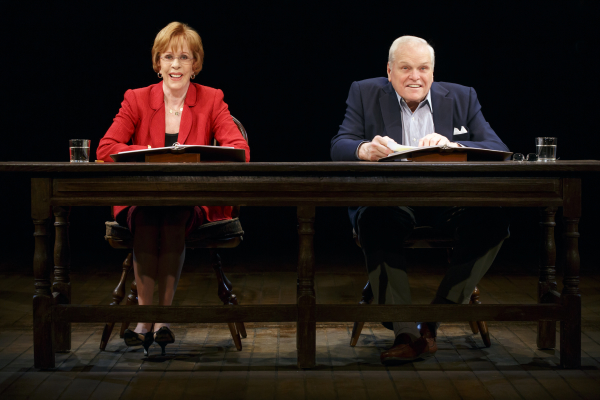Love Letters With Carol Burnett

(© Carol Rosegg)
In A.R. Gurney's Love Letters (now playing at the Brooks Atkinson Theatre on Broadway), nothing separates the audience from the performers. There's no production: just the actors, the scripts (the show is presented as a table reading), and hundreds of paying customers. As a result, the play entirely rests on its two actors' ability to convey the story. Carol Burnett (who recently took over the role of Melissa from Mia Farrow) is arguably one of the greatest living comedians. In Love Letters, she also reminds us that she is a skilled dramatic actor.
Love Letters is the story of the decades-long relationship between Andrew Makepeace Ladd III (Brian Dennehy) and Melissa Gardner (Burnett). Both are products of a Northeastern enclave of privilege that they refer to as "the Land of Oz." According to Andy, Melissa is its princess. Childhood friends, frequent correspondents, and eventually lovers, Andy and Melissa take radically divergent paths in adulthood. He joins the navy, attends Ivy League schools, and becomes a senator. She becomes an artist and alcoholic. Through everything, they stay in contact amid a series of letters that form the entire text of the play.
Burnett has a more natural touch with comedy than her predecessor, and the laughs are there to prove it. "I was. I did. I'm not now," she deadpans when Andy inquires about her second marriage. The audience is in hysterics. Burnett's habit of swallowing her vowels simultaneously creates a humorous delivery, but also tells the story of a woman who is an alien in the rarified surroundings in which she was born. In a world where everyone sounds like Eleanor Roosevelt, this Melissa sounds like, well, Carol Burnett — more of a clown than a debutante.
Yet while Burnett has mastered the timing on Gurney's laugh lines, she brings an understated power to the play's heavier aspects. One gets the sense that Melissa is a person who sees the world differently than most people and that is why Andy loves her. Taking this charm into account, it is very easy to feel empathy for her as she holds back the tears and grimaces of disappointment at a life over which she has less and less control. One wouldn't expect such a nuanced performance from an actress accustomed to playing big characters in sketch comedy, but Burnett brings it, and remarkably so, with only a few unfortunate moments of exaggerated mugging.
Costume designer Jane Greenwood further complicates this version of Melissa by playing against Burnett's portrayal, outfitting her in a red blazer and matching skirt. She looks like a Republican senator's wife, rather than the woman on the side she's actually playing. This only helps to further accentuate the sense that Melissa is out of place in the Land of Oz. The pair's crossing character arcs (Melissa going from wealthy and worldly to a total mess, while Andy goes from a naive puppy dog to an all-American patriarch) come into sharp focus.
Dennehy (who appeared opposite Farrow last month) has grown into his role, offering glimmers of humanity behind the stoic patrician he's playing. He seems genuinely amused by Melissa's refreshing honesty and deeply hurt by her unraveling. It's thrilling to see how a different scene partner can change another actor's performance.
One of the best things about Burnett's performance is her ability to connect with the audience. As Gurney recommends in the script, Burnett looks out at the audience and reacts when Dennehy is reading. This seems like a simple thing, but it's not. (Many actors give into the temptation to look down at the script and follow along when their partner is reading.) Burnett's expressive face offers an entire level of storytelling beyond the words, clueing us into Melissa's inner world.
You may think you've seen this play, but you'll see it in a whole new way with this month's cast.










